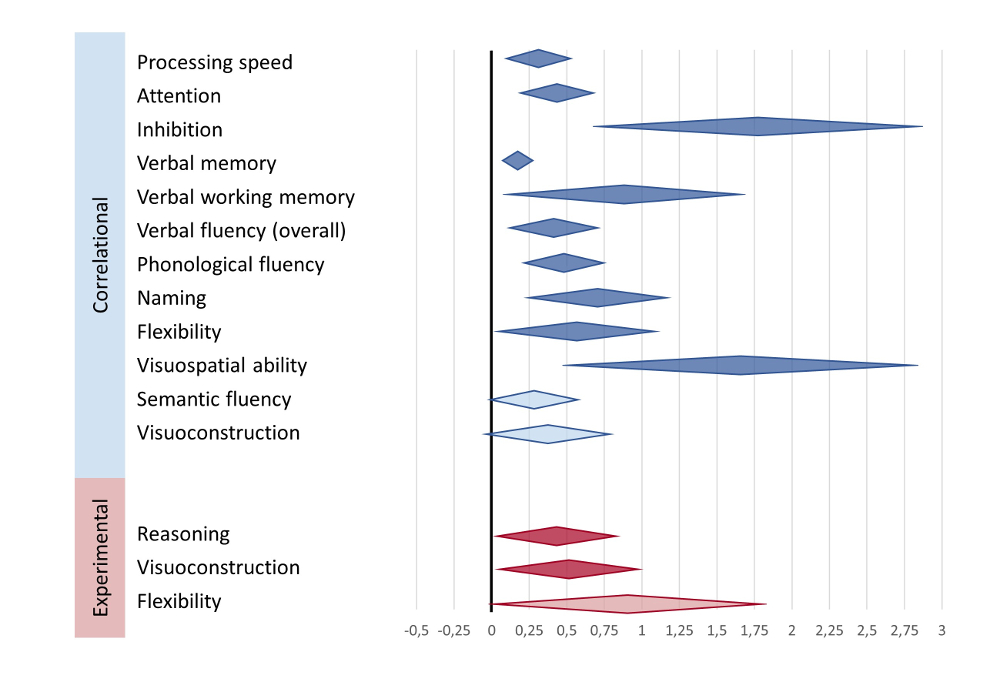Rafael Román-Caballero and Juan Lupiáñez
Centro de Investigación Mente, Cerebro y Comportamiento (CIMCYC), Universidad de Granada, España

(dp) Free-Photos.
With the interest on cognitive training programs, research on musical practice has been on the raise. Although the results still have to be interpreted with caution, the evidence accumulated so far suggests that this activity could improve different cognitive skills, both those directly trained by musical performance (auditory and motor skills) and more general ones (e.g., inhibitory control). These benefits are clearer in early developmental stages and contexts in which cognitive functions are compromised, such as normal aging. Musical training is a promising tool for cognitive enhancement.
The interest in cognitive stimulation techniques has grown remarkably in recent decades. On the one hand, much research effort is dedicated to the design of interventions to improve the early development of cognitive functions. Currently, it is considered very important that the training offers an improvement in transversal skills such as problem solving or social skills, preparing the person for multiple scenarios (Tervaniemi, Tao & Huotilainen, 2018). On the other hand, interventions have been sought to enhance cognitive abilities in adult stages («cognitive optimization») or to reduce the negative impact of aging (Román-Caballero, Arnedo, Triviño & Lupiáñez, 2018).
Musical practice is a most stimulating activity. Playing an instrument involves multiple sensory and motor systems and requires a wide variety of higher-level cognitive processes (Herholz & Zatorre, 2012). Musical practice also seems to be an optimal cognitive activity, since it involves regular and motivated practice of progressive difficulty, which poses constant challenges to the practicioner (Bugos et al., 2007). In fact, previous research has shown that musical training during childhood can produce improvements in auditory processing and motor skills, as well as changes in the underlying neural circuits (Herholz & Zatorre, 2012). Moreover, musical activity during childhood has been associated with advantages in domain-general functions, such as executive functions or memory, along with benefits in intelligence and academic achievement (Tervaniemi et al., 2018).
Adult musicians also perform better in directly trained skills (auditory and motor skills) as well as in a wider range of domain-general functions (Herholz & Zatorre, 2012). Structural and functional changes have been found in regions of the brain not closely related to sensorimotor aspects, such as increases in the volume of gray matter in frontal and parietal areas (James et al., 2014) or a greater activity in memory-related regions during the retrieval of verbal information (Huang et al., 2010). Although research on training programs in adulthood is scarce, the observed benefits in adult musicians are frequently related to the age of onset of musical practice, which suggests that early programs are more effective (Herholz & Zatorre, 2012).
In a recent meta-analysis conducted by our group (Román-Caballero et al., 2018), we observed that musical practice is also related to cognitive benefits during normal aging (both in domain-specific and domain-general functions). Furthermore, these benefits were observed both in nine studies that compared musicians with non-musicians (correlational) as well as in four late training programs (experimental; see Figure 1), although greater benefits were observed with long-term practice and an earlier onset.

Figure 1.- Domain-general cognitive functions in which a benefit associated with musical practice was observed. The graph represents the meta-analytic effect sizes (measured with Hedges’ g), where values above 0 indicate improvements in favor of musical practice. Adapted from the meta-analysis of Román-Caballero et al. (2018).
Nevertheless, most evidence comes from correlational studies, which prevents us from knowing whether the improvements are due to practice or to predisposing factors (musicians may have idiosyncratic cognitive characteristics that lead them to choose this activity). In addition, not all the studies conducted so far meet criteria of methodological quality and there are too few to achieve an acceptable power in the analysis of publication bias. Some studies also use passive control groups (without any intervention). All these are aspects that usually compromise the interpretation of cognitive training results (Sala & Gobet, 2018).
Despite such limitations, the results of the meta-analysis suggest that there could be a transfer effect of musical practice, which is of central importance. Since musical interpretation involves multiple processes, it is likely that some of the changes in domain-general functions are due to the specific training of many of them (Román-Caballero et al., 2018). However, the observed effects are surprisingly broad (in an unexpectedly large number of functions), which has led to alternative explanations. On the one hand, it has been suggested that advantages in many non-musical abilities result from the improvement of functions with a transversal nature (e.g., inhibitory control; Moreno & Farzan, 2015). Otherwise, musical practice seems to promote the ability to cope with tasks using alternative strategies, which may improve performance. Thus, it has been observed during verbal memory tasks that musicians exhibit activation in the visual cortex (usually inactive during the retrieval of verbal information; Huang et al., 2010).
Although these findings point to musical practice as a promising intervention, the number of available studies is still reduced. More research is needed to establish the impact of musical practice on cognition. We hope to see clearer evidence that a more musically active world is a better world.
References
Bugos, J. A., Perlstein, W. M., McCrae, C. S., Brophy, T. S., & Bedenbaugh, P. H. (2007). Individualized piano instruction enhances executive functioning and working memory in older adults. Aging and Mental Health, 11, 464-471.
Herholz, S. C., & Zatorre, R. J. (2012). Musical training as a framework for brain plasticity: Behavior, function, and structure. Neuron, 76, 486–502.
Huang, Z., Zhang, J. X., Yang, Z., Dong, G., Wu, J., Chan, A. S., & Weng, X. (2010). Verbal memory retrieval engages visual cortex in musicians. Neuroscience, 168, 179–189.
James, C. E., Oechslin, M. S., Van De Ville, D., Hauert, C. A., Descloux, C., & Lazeyras, F. (2014). Musical training intensity yields opposite effects on grey matter density in cognitive versus sensorimotor networks. Brain Structure and Function, 219, 353–366.
Moreno, S., & Farzan, F. (2015). Music training and inhibitory control: A multidimensional model. Annals of the New York Academy of Sciences, 1337, 147–152.
Román-Caballero, R., Arnedo, M., Triviño, M., & Lupiáñez, J. (2018). Musical practice as an enhancer of cognitive function in healthy aging – A systematic review and meta-analysis. PLoS ONE, 13, e0207957.
Sala, G., & Gobet, F. (2018). Cognitive training does not enhance general cognition. Trends in Cognitive Sciences, 23, 9-20.
Tervaniemi, M., Tao, S., & Huotilainen, M. (2018). Promises of music in education? Frontiers in Education, 3, 74.
Manuscript received on November 27th, 2018.
Accepted on February 12th, 2019.
This is the English version of
Román-Caballero, R., y Lupiáñez, J. (2019). El impacto cognitivo de la práctica musical: Explorando las ventajas de un mundo musicalmente activo. Ciencia Cognitiva, 13:1, 21-23.

